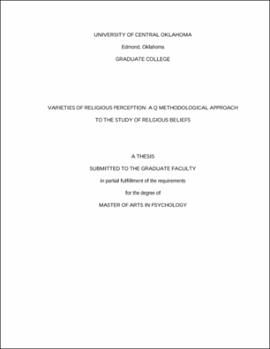| dc.description.abstract | Religion is at the heart of all cultures. Three of the most widely known religions are Christianity, Islam, and Judaism. To determine if differences exist, a Q-methodology study of religious beliefs was conducted. The experiment consisted of two parts: an extensive study and an intensive study. Experiment 1 involved participants completing a q-sort asking about personal religious beliefs. A FANOVA, a combination of Principle Components Analysis (PCA) and a Multivariate Analysis of Variance (MANOVA), was run. Two factors emerged: a religious factor and a nonreligious factor. The results for Factor 1 F(3, 157) = 82.188, p < .001, Unknown node type: fUnknown node type: f2 </math> = 0.661, and Factor 2 were F(3, 157) = 76.330, p < .001, Unknown node type: fUnknown node type: fh&d12;2 </math> = 0.593; KMO = 0.822. The null hypothesis was rejected. Experiment 2 was conducted to analyze beliefs from prominent members of religions. A Catholic priest, a Muslim Imam, and a Jewish Rabbi completed an intensive sixteen-item q-sort. From the intensive study, three factors emerged in all participants: a religious factor, a parental factor, and a spiritual factor. These results show that religiosity differs from spirituality. Secondly, it suggests that parents have an overwhelming effect on religious beliefs. The results from both experiments suggest that the perception of religious beliefs is similar in all religions tested despite differences observed in the media. Keywords: religion, psychology, Q-methodology, Christianity, Judaism, Islam, Atheism, comparative religion | |
